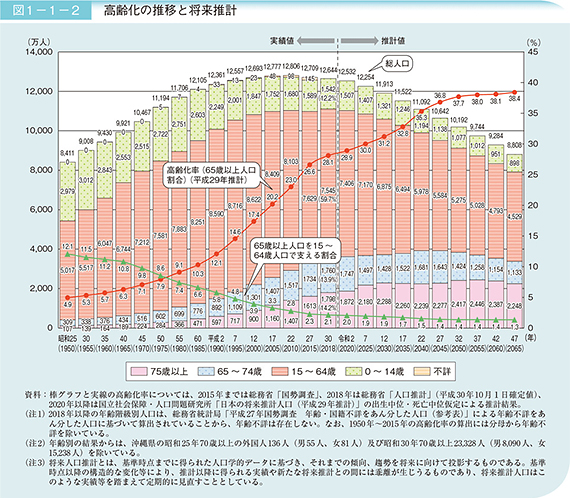In 2019, the number of babies born in Japan dropped below 900 thousand for the first time since the end of World War II. The current birth rate is hovering around 1.45, and if this level continues, the population of Japan will gradually decline and dip below 100 million people by 2053. (Currently, 128 million)
On the other hand, Japanís society is rapidly aging. The percentage over 65 years old is 28, or around 36 million people, and those over 75 years of age is 14%, or around 18 million people.
In a quickly aging society with fewer children, Japan will be deprived of its vitality, which will lead to a decline of industry, and unsustainability of medical care system, elderly care and pension systems. In particular, the government expenditure for social security has been expanding and has reached around 43 trillion yen for 2019, while tax revenues account for about 60 trillion yen.
As a consequence, an aging society has imposed tremendous pressure to government finances. In order to secure sources of revenue, the Abe administration raised the consumption tax rate from 5% to 10% over the last five years. This has enabled the government to secure 14 trillion yen in tax revenues. However, despite the tax hike, the government expenditure for social security will further increase year on year, since society is rapidly aging.
As for the countermeasures against the declining birth rate, the Abe administration approved free education for children (3-5 years), as well as for private senior high school students and university students whose parents are classified as low income. Elementary school to junior high school is compulsory in Japan, and public senior high schools have been free since 2011.
The government has to research the causes of the declining of birth rate from various viewpoints such as economy, working styles, parental support, and so forth. Generally speaking, it is said that sluggish growth of real wages, shortages in nursery schools and teachers, increases in female workers with advanced academic backgrounds with a tendency to get married later in life, heavy burdens for education, and so on. This issue need to be addressed not only by the government, but also by the private sector to create a society where younger generation can get married and have children.
